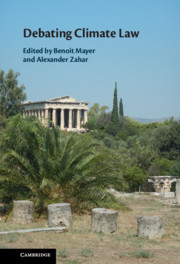Book contents
- Debating Climate Law
- Debating Climate Law
- Copyright page
- Contents
- Contributors
- Acknowledgements
- Abbreviations
- Introduction
- Debate 1: Customary Law
- Debate 2: The ILC’s Role
- Debate 3: CBDR Principle
- Debate 4: Compliance
- Debate 5: Climate Litigation
- Debate 6: Human Rights
- Debate 7: Historical Responsibility
- Debate 8: Climate Migration
- Debate 9: Negative-Emission Technologies
- ~ A ~ An Emission-Reduction Commitment Is a Plan for the Future: Developing and Using New NETs Should Be at the Heart of That Plan
- ~ B ~ It Would Be Irresponsible, Unethical, and Unlawful to Rely on NETs at Large Scale Instead of Mitigation
- Debate 10: Solar Radiation Management
- Debate 11: Climate Assessment
- Reflection 1: Adaptation
- Reflection 2: Loss and Damage
- Reflection 3: Disappearing States
- Reflection 4: Climate Finance
- Reflection 5: Non-State Actors
- Reflection 6: Regime Inconsistency
- Reflection 7: Aesthetics
- Conclusion
- Index
~ B ~ - It Would Be Irresponsible, Unethical, and Unlawful to Rely on NETs at Large Scale Instead of Mitigation
from Debate 9: Negative-Emission Technologies
Published online by Cambridge University Press: 15 June 2021
- Debating Climate Law
- Debating Climate Law
- Copyright page
- Contents
- Contributors
- Acknowledgements
- Abbreviations
- Introduction
- Debate 1: Customary Law
- Debate 2: The ILC’s Role
- Debate 3: CBDR Principle
- Debate 4: Compliance
- Debate 5: Climate Litigation
- Debate 6: Human Rights
- Debate 7: Historical Responsibility
- Debate 8: Climate Migration
- Debate 9: Negative-Emission Technologies
- ~ A ~ An Emission-Reduction Commitment Is a Plan for the Future: Developing and Using New NETs Should Be at the Heart of That Plan
- ~ B ~ It Would Be Irresponsible, Unethical, and Unlawful to Rely on NETs at Large Scale Instead of Mitigation
- Debate 10: Solar Radiation Management
- Debate 11: Climate Assessment
- Reflection 1: Adaptation
- Reflection 2: Loss and Damage
- Reflection 3: Disappearing States
- Reflection 4: Climate Finance
- Reflection 5: Non-State Actors
- Reflection 6: Regime Inconsistency
- Reflection 7: Aesthetics
- Conclusion
- Index
Summary
NETs range from afforestation to bioenergy with carbon capture and storage. They are seen by many as instrumental in achieving the mitigation objectives of the Paris Agreement. However, uncertainty remains regarding the technical, economic, and political feasibility of the large-scale deployment of NETs. The focus in this chapter is on whether a state may lawfully presume, for instance in the course of determining its long-term low-greenhouse-gas-emission development pathway under Article 4(19) of the Paris Agreement, that a future large-scale deployment of NETs will be realized. Gareth Davies maintains that that makes perfect sense, not least because conventional mitigation methods are in the same boat (of uncertainty), and that in other respects as well conventional methods are on a continuum with NETs. By contrast, Duncan McLaren and Wil Burns argue that any heavy reliance now on a presumed large-scale availability of NETs in the future would be irresponsible, unethical, and unlawful.
Keywords
Information
- Type
- Chapter
- Information
- Debating Climate Law , pp. 241 - 256Publisher: Cambridge University PressPrint publication year: 2021
